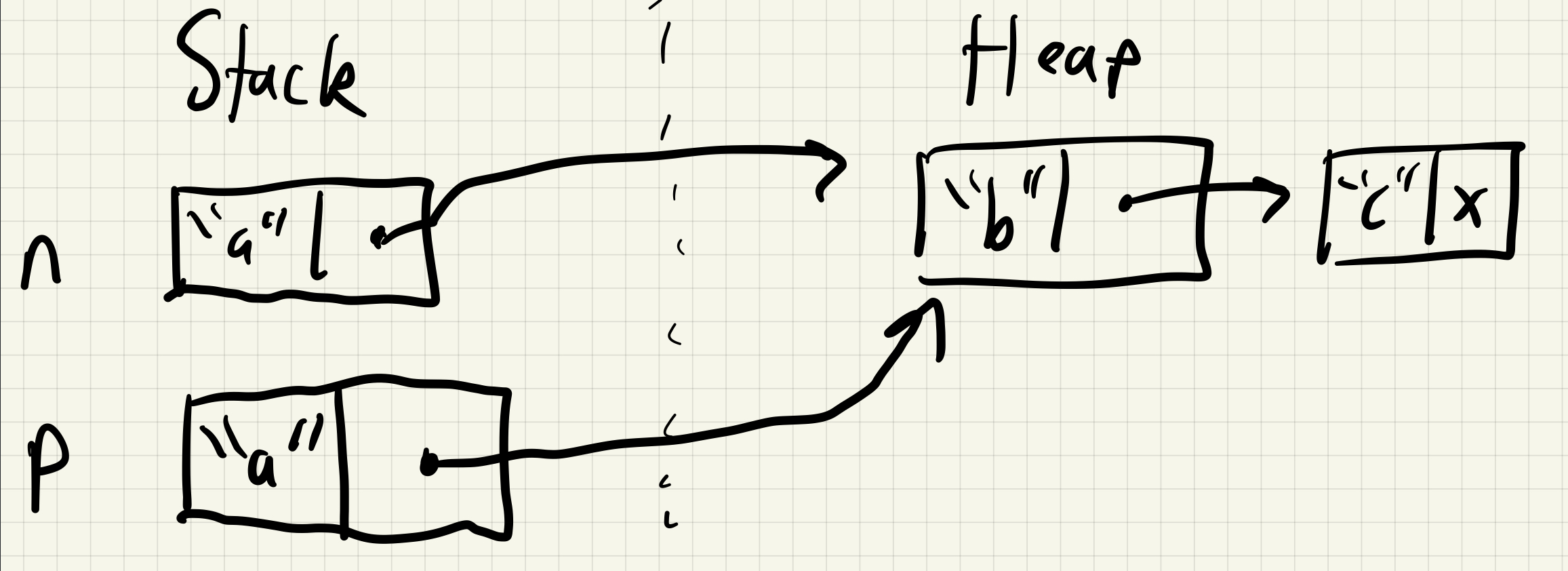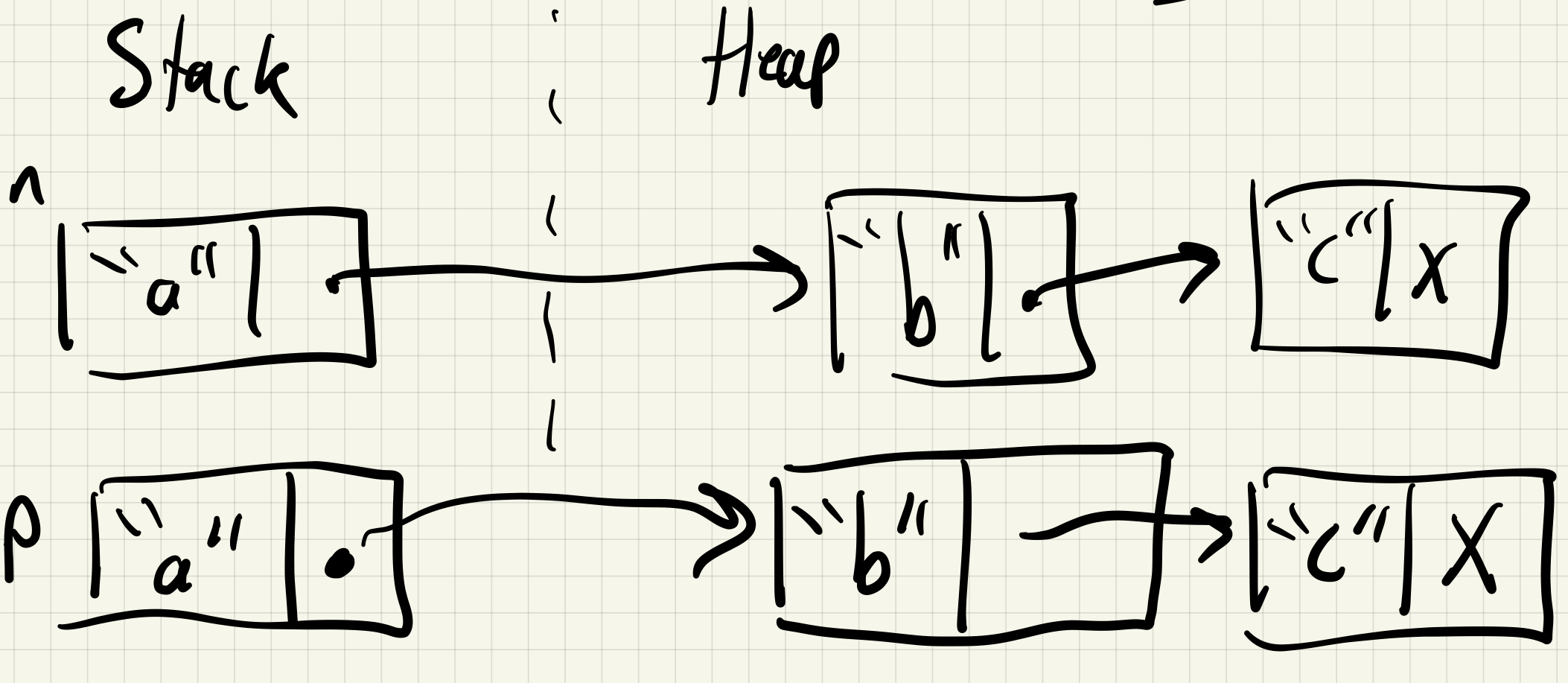CS247 Lecture 3
Last time: CS 247 Lecture 2 MIL, Operator overloading This Time: Operator overloading finished. Value categories. Linked List Abstract Data Type.
Implementation as a method for operators
There are some operator overloads that MUST be defined as methods in the class. These are:
operator=operator[]operator->operator()operator Twhere T is a type.
Supporting division of Rationals, e.g q/r. (Exercise)
Supporting cout << q << endl where q is a Rational:
class Rational{
...
friend ostream& operator<<(ostream& out, const Rational& r);
};
ostream& operator<<(ostream& out, const Rational& r){
out << r.num << "/" << r.denom;
return out; // to support chaining
}- We want an ostream on the lhs→standalone function, need access to q.num, q.denom, need to declare as a friend.
- Usually we don not provide
endlin theoperator<<definition. Don’t want to force our users to use new lines.
Consider:
ofstream file{"file.txt"};
Rational r{5,7};
file << r << endl;- ofstream is an ostream, so here, we print out in the file. We pass file into out. Print out to the file r.num / r.denom.
- Our
operator<<andoperator>>definitions also work for reading from and printing to files (and other types of streams).
Finally, Rational z{q};
or Rational z = q; or Rational z(q)
- Running the copy constructor. (because
zis declared for the first time) - Compiler provides a copy ctor that simply copies all the fields. We can also write our own.
class Rational{
...
public:
Rational(const Rational& other): num{other.num}, denom{other.denom}{}
};Rational q{3, 4}
Rational z{q}; // copy ctor
Rational r{2, 3};
Rational p{1, 2};
r = p; // assignment operator, it already exists
Having written all of these operator overloads our Rational Abstract Data Type is easy to use from a client perspective. Exercise: Preventing denom = 0. Multiplication and substractoin arithmetic operators.
Takeaways
- Overloading operators gives us a convenient syntax.
- Classes allow us to enforce invariants, good ADT design.
- Friends can be used (sparingly) to give access to private fields.
As they say in C++ You should never have too many friends. Which shouldn’t be a problem for waterloo students…
Value Category
Every expression in C++ has both a type and a value category. We’ll discuss 2 categories: lvalues and rvalues.
An lvalue is any expression that you can take the address of. For example:
int x = 5;
f(x); // this expression 'x': we can take its address -> it is an lvalueAn rvalue is a temporary values, it will be destroyed “soon”. For example:
f(5); // 5 is an rvalue. We cannot take the address of 5.Another example:
string f(){
return "Hello World";
}
string s = f(); // This expression is an rvalue. The returned result of f only exists until the end of the line.We cannot run &f() - the string isn’t stored anywhere permanently, just put in a temporrary until it is saved into s.
Note
The references we have seen so far are lvalue references. These can only bind to expressions that are lvalues.
For example:
int x = 5;
int& y = x; // check
int& z = 5; // 5 is an rvalue, z is a reference. Does not compile.An exception: We can bind rvalues to const lvalue references (No complaints of changing anything!)
f(int& x){ // does not compile
...
}
g(const int& x)}{ // compiles
...
}
f(5); // not allowed
g(5); //although 5 is rvalue, we are not going to change x in g() because of const.
This is allowed, we won’t modify x, the compiler creates a temporary memory location to store the 5 in.
We can create rvalue references
Extend the lifetime of the rvalue to the lifetime of the reference. (References to temporary values)
string f(){
return "Hello World";
}
string&& s = f(); // string&& is an rvalue reference.- Can use the temporary value returned by f for as long as s exists.
- Usually we just do
string s = f();
Most commonly, used for overloading functions based on the value category of the expression:
void f(const string& s){
cout << "1" << endl;
}
void f(string&& s){ // takes in rvalue reference to string
cout << "2" << endl;
}
string s{"CS247"};
f(s); // lvalue, we get 1
f(string{"CS247"}); // creating temp string to store cs247 is an rvalue, we get 2Why is this useful? We’ll see shortly. Finally - note type and value categories are independent properties
void f(string&& s){
cout << s << endl; // in this expression, although s references an rvalue, we can take s's address -> s is an lvalue.
}Linked List Abstract Data Type
A slightly more complicated ADT example. Specifically I want to leverage lvalue/rvalue knowledge for efficiency. We’ll focus on invariants and encapsulation later. Now, we want correctness and efficiency.
struct Node {
string data;
Node* next;
};I want the following client code:
Node n{"a", new Node{"b", new Node{"c", nullptr}}};
Node p{n};
p.next->data = "z";
cout << p; // a, z, c
cout << n; // a, b, cFirst, ctor:
Node::Node(const string& data, Node* next): data{data}, next{next}{}Next:
Node p{n}; // This executes the copy ctor - provided by compiler. Copies each field.
- But we just want p to be modified if we just use the compiler provided compiler!
- Now,
p.next->data = "z", modifies n as well! We have shared data. We’ll define our own copy ctor that recursively copies the data structure.
Custom copy ctor:
Node:: Node(const Node& other): data{other.data},next{other.next? new Node{*(other.next)}:nullptr}{}- Recursively calling itself with
new Node{*(other.next)}. NowNode p{n};will perform a deep copy withour custom copy ctor:
- This is a deep copy, as oppposed to a shallow copy.
Links to this page CS247 - Software Engineering Principles